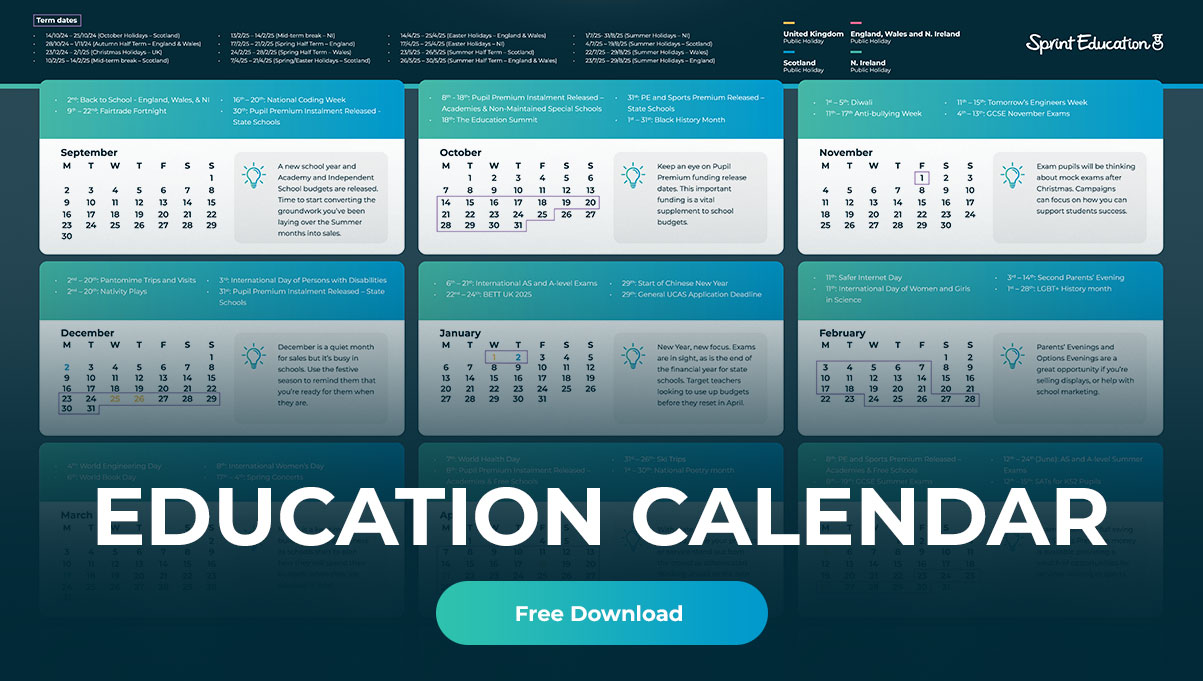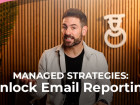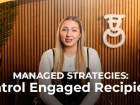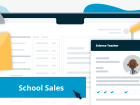Selling to Schools 101: The Ultimate Guide
Selling to Schools 101: The Ultimate Guide
Go from novice to pro with our education marketing guide designed to unlock success for your selling-to-schools solution.
Go from novice to pro with our education marketing guide designed to unlock success for your selling-to-schools solution.
Are you a budding education supplier ready to grow into a thriving education business? Stepping into the UK's vast education sector might seem like a daunting leap, but you've landed in precisely the right spot.
Selling to schools offers fantastic potential, but it's a journey that calls for a well-thought-out strategy and a grasp of the distinctive dynamics of the educational landscape.
Welcome to your ultimate guide to selling to schools. We'll help you navigate the crucial steps to understanding education marketing, no matter how much experience you already have. Get ready to unlock the secrets of success!
Understanding the Education Business
Before diving into the world of selling to schools, it's crucial to grasp the nuances of the education sector. It covers products and services for schools, teachers, students, and administrators, falling into two categories:
Educational: Support teaching and learning, like textbooks, software, and training programmes.
Non-Educational: Assist school operations, such as cleaning, catering, and maintenance.
What are the different school types and who are the key decision-makers?
The education sector is diverse, with different job roles depending on the type of school, and understanding what they are is essential to identifying the purchasing decision-makers:
Primary Schools
A Primary School in the UK is an institution that provides foundational education for children typically aged 4 to 11, covering Key Stages 1 and 2.
In Primary Schools, Head Teachers typically have the final say on spending. They are often supported by middle leaders such as Department Coordinators and Key Stage Coordinators.
Secondary Schools
A Secondary School in the UK is an establishment that offers education for students aged 11 to 16, with many continuing to 18, encompassing Key Stages 3, 4, and 5 for post-16 education.
Secondary Schools have more decentralised spending. The Head Teacher may approve all purchases, but budgets are allocated to different departments, each with its own Head. Additionally, School Business Managers play a significant role in overseeing finances and procurement.
Multi-Academy Trusts (MATs)
Composed of multiple Academies, Multi-Academy Trusts form a chain of schools with members overseeing governance and a Board of Trustees making decisions for all. The MAT employs all staff, while individual Academies receive funding directly from the Department for Education, shared according to a common Academy Funding Agreement.
In MATs, the Executive Team are the ultimate decision-makers, whilst Directors are responsible for specific strategic areas within the trust.
For greater detail on school types and job roles, see our guides below:
- A guide to the UK’s educational establishment types
- A who’s who guide to UK school staff
- How to sell to Multi-Academy Trusts
- A who’s who guide to UK MAT staff
How do I build a successful marketing-to-schools strategy?
With a grounding in school types and the key decision makers, the next step is identifying the fundamental elements to build a well-rounded education marketing strategy.
Build Relationships
To build relationships with teachers and decision-makers, show that you understand the unique challenges and priorities in schools. A straightforward way to achieve this is by timing your communications for when teachers are less busy and being flexible with when you can schedule follow-up conversations.
Framing your marketing copy in a way that empathises with the challenges teachers face can enhance your influence. For example, presenting a digital tool as a workload reduction method rather than a means to make educators more efficient shows teachers you have their back.
More on building relationships:
Provide Value
Teachers are often time-poor and work within specific budgets, so if you can demonstrate how your products or services can solve real problems in schools and save money, you’ll be in demand. Target the current challenges schools face and provide a clear time-saving solution. Or, even better, show your knowledge of how to streamline the process of accessing new resources or funding streams.
Whether it is temporary classroom provision offered during building safety closures or showing awareness of how to supplement school spending around a targeted funding stream, take the pain out of purchasing to maximise sales.
Of course, reducing costs provides clear value. Promotions such as offering free resources, free trial periods, discounts, and even reduced rates for bulk purchases all catch the eye and encourage teachers to sample your solution. Such cost-saving measures offer demonstrable value, particularly relevant as schools navigate the challenges created by the rising cost of living.
More on spending and providing value:
Consistency
Regularly engage with your target audience. This is a competitive marketplace, and staying visible is key. Part of this comes down to understanding the key purchasing periods during the school year, such as September, June, and April. How will you build an effective campaign in the lead-up?
Hot tip: don’t wait until the first week of the school term to share your lesson resources products and don’t leave your playgrounds project pitch until mid-June, otherwise, you’ll already be behind your competitors. Prioritise understanding how school terms work and when to start building your brand’s recognition for targeted visibility.
More on consistency and visibility:
The Ripple Effect
Educators are highly collaborative individuals who aspire to achieve the best not only for their own students but for all students. When they see the impact your product or service is having on results, school culture, and student wellbeing, or how it allows them to make the most of their budgets, they won’t just share their experiences — they’ll shout about them!
Staffroom discussions, well-attended conferences, and training events create an in-person buzz about your solution. In the multitudes of online teaching and leadership-focused groups, teachers will readily share and even champion your solution.
Getting your message across is essential to creating a ripple effect that leads to success, but what are the means of communicating with teachers, and how effective can they be?
Email Marketing: The Preferred Choice
Email marketing to schools is cost-efficient, and you can quickly connect with potential clients with the right database. This method allows you to send direct and impactful messages, and what’s more, it’s teachers' preferred means of receiving marketing and the most consistently checked form of communication whilst educators are in work mode.
How do we know that? Well, in our landmark survey, we found that:
87.6% of educators said they are most likely to respond to email above any other form of communication.
When you consider this alongside how often they check their emails:
46.8% of teachers said that they check their work inbox more than ten times per day.
It’s clear why email is the stand-out education marketing communication method of choice: it’s popular and consistently accessed. Teachers will be more likely to view your tailored content and discover your solution. Email acts like the front door to your digital storefront.
More on reliable school databases and email:
Postal Marketing: A Valuable Option
While email has outpaced postal marketing, postal still has value. Response rates have risen for direct mail as fewer letters reach school offices, making physical mail more appreciated.
Having printed content sent directly to staff or sitting on coffee tables in staffrooms can be powerful, with pigeon holes being the second most frequently checked communication means, even outperforming the frequency of social media checks. Make use of this medium to stand out.
More on postal marketing:
Telephone Marketing: A Follow-Up Tactic
Telephone marketing, in the first instance, is the least popular form of communication, meaning it takes a back seat in initial education marketing. However, it's valuable for building connections with leads further down your sales funnel. Calls arranged once a decision-maker has already shown an interest in your solution allow you to establish personal connections with your audience.
The Power of Personalised Marketing
To convert more schools into paying customers, you must speak directly to educators by segmenting your marketing. Email enables you to do this.
To personalise your marketing, you need:
1. An effective email marketing platform to manage your sales pipeline.
2. The latest education sector intelligence to speak to teachers.
Our ultimate education marketing solution – Campus – does both.
An effective email marketing platform to manage your sales pipeline
Campus is your ultimate competitive advantage – the education marketing platform that will transform you from a novice in selling to schools into an education strategy pro. With Campus, you can:
Customise Your Schools Pipeline: Create tailored messaging so that you can send relevant content to new deals based on their status.
Engage with Educators: Connect with interested teachers, view their interactions with your business, send unlimited 1-2-1 emails, and log calls.
Respond in Real-time: Receive automatic notifications whenever an engaged contact interacts with your marketing, website, or brand so you can react in real time.
Manage Tasks Efficiently: Take advantage of every sales opportunity with task management tools to target deals and never miss a lead.
Retarget Dormant Leads: Easily turn quotes into invoices with one click and build marketing lists based on customers' purchasing history.
In short, it’s where personalised marketing and selling to schools happens.
More on how Campus can streamline your education sales funnel:
The latest education sector intelligence to speak to teachers
Pairing an effective email platform with education sector intelligence empowers your business to connect with schools, and, crucially, ensures your solutions precisely align with the ever-evolving landscape of education.
On Campus, access education intelligence in Resources, such as: Education News Bulletins: Stay updated with fortnightly bulletins featuring crucial education insights.
Groundbreaking Reports and Guides: Access annual reports, a wealth of eBooks, and sector-specific Marketing Guides.
Video Insights: Featuring conversations from our Education Team, guiding you through our detailed reports.
Education Calendars: View academic year calendars that show when term dates fall and the standout education events.
Find What Matters at Your Fingertips: Easily explore Resources and favourite the content most relevant to you.
You don't need to be a current or former teacher to gain expertise in the education sector. Instead, leverage our extensive education sector knowledge on Campus Resources, all from the comfort of your home.
More on Campus’s education intelligence:
- Live sector insights and intelligence
- Academy: Free to download education marketing whitepapers
- Resources: Your pathway to education marketing expertise
Ready to get started?
Now that you’ve read the ultimate guide for selling-to-schools success, it's time to make your mark on this exciting and rewarding industry. With the right tools and knowledge, you can convert more schools into paying customers, build lasting relationships in the education sector, and improve outcomes for students.
Want to take action? Arrange a Campus demo to start planning your first email campaign.
Need more detail? Read our industry-leading report The State of Selling to Schools.
Have questions? Get in touch, our friendly team will point you in the right direction.
Embrace the opportunities available in education marketing, stay informed, and let your selling-to-school strategies shine. Your success story in this thriving sector begins now!
Tags
Campus
Education Marketing
How to Sell to Schools
How to Sell to Teachers
Selling to Schools
Selling to Teachers
Similar Articles


Building a Landing Page That Teachers Love
Learn how to capture teachers' interest within 5 seconds of them reaching your landing page.


State of Selling to Schools 2022 (Part 1)
Explore insights into schools’ problems and their priorities for the year ahead.


Expert marketing to schools support and solutions
Expert marketing to schools solutions
Email Head Teachers, Teachers, and Staff Inboxes
Email teachers and staff inboxes
Sell More to UK and Global Schools and Colleges
Sell more to schools and colleges
































